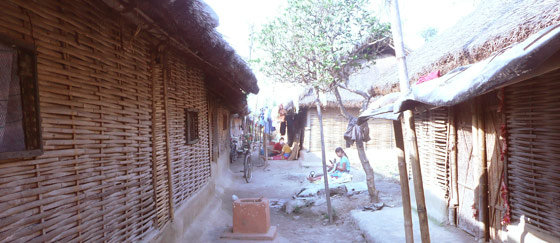
November 24, 2015

More than 60,000 Bhutanese refugees are forced to live in camps like this in Nepal and India.
Story by: Lisa Squires; photo by Sherri Gallant and Lethbridge Immigrant Services
They’ve travelled halfway around the world and landed in a completely different culture, but the 1,000 or so Bhutanese refugees who have setted in Lethbridge have found a warm welcome.
Earlier this fall, a small group of Bhutanese refugees attended a presentation to learn about a Newcomer Health Group that’s helping new Canadians learn about health, wellness and access to care in their new home.
“I hope this Newcomer Health Group will help people like us, who have limited English, and are eager to learn about our health and how to live healthy,” says Nar Maya Darji, 69. “It is very nice to have something written in our own language.”
And that is precisely the goal of the group, says Stasha Donahue, Alberta Health Services (AHS) Diversity and Self-Management co-ordinator and facilitator of the Newcomer Health Group.
The group is a partnership between local physicians and health providers, Lethbridge Family Services – Immigrant Services and the local community from the Himalayan South Asian country. It was created to address common challenges identified in a 2014 health needs assessment, including the need to improve health literacy and communication.
“Many new Canadians struggle with language, cultural, economic, education, employment and other barriers that impact their overall health and well-being,” Donahue says.
“Health literacy refers to an individual’s ability to understand and use information to make informed choices about their health. As clinicians, we value technical skills but softer skills, like communication, are equally important. If patients don’t understand what we’re telling them or what they need to do, they won’t get better.”
According to the health needs assessment, many refugees lack basic health knowledge about nutrition, chronic disease prevention and maintenance, and mental health issues.
At the presentation, members of the Newcomer Health Group shared resources they’re developing that they hope will help. Canada’s Food Guide has been translated into Nepali and adapted to better reflect Bhutanese choices. Medication labels are also being translated and will incorporate more visual cues and pictures. Mental health information about anxiety and depression, and information about seniors’ services are also being customized.
“I like the way they translate the Canadian food guide,” says Dhan Man Teluij Gurung, 66, who attended the talk. “I wish there are more health-related papers so I can read and explain it to my family.”
In about 1990, approximately 100,000 Bhutanese refugees of Nepalese descent were forced from Bhutan and into refugee camps in Nepal and India, persecuted for their ethnicity.
Manoj Dhakal, a registered nurse working with AHS Home Care, was born in Bhutan and moved to Canada in 2008, then to Lethbridge in 2009. He knows what it’s like to adapt to a new culture. Now, as a member of the Newcomer Health Group, he’s helping others adjust and get settled into their new lives.
“I love working with seniors,” says Dhakal, who provides interpretation services and helps explain the Canadian health care system. “Bhutanese seniors are not familiar with a preventive and health promotion model of care. Many seniors don’t believe in Western treatment and prefer more traditional, spiritual treatments. By the time they approach a physician, it can be too late.”
Dr. Eric Bly, who works out of Campbell Clinic West, joined the group to better support his patients, many of whom are Bhutanese. He says many refugees struggle with nutritional issues or medical conditions that have worsened over time due to lack of care in refugee camps.
“People have had limited access to care and might not have seen a doctor in 20 years,” says Bly. “Minor eye injuries or ear infections that could have been easily treated have turned into blindness and hearing loss. And when you’ve had limited access to care and you’re worried about where your next meal is coming from, you don’t think about calories, fat, or how many fruits and vegetables you should be eating.”
Donahue says that’s why the group was created: to help people get the care they need, when they need it, in a way they can understand. She says the group works closely with Lethbridge Family Services, a not-for-profit organization that provides community based support services to individuals and families. Immigrant Services is a department within the organization devoted to helping recently immigrated newcomers get settled, which can take anywhere from six months to a year.
“We’re creating a health network for newcomers – kind of one-stop-shopping where people can access whatever they need,” says Donahue. “Not all issues are health issues, but things like housing, employment and education greatly affect a person’s health. To truly make a difference, we are offering a more patient-centred approach to care, especially when working with diverse populations.”
And for that the Bhutanese newcomers are truly grateful.
“It is very helpful,” Gurung says. “Thank you very much for helping us.”
For information about the Newcomer Health Group, contact Stasha Donahue at 403-553-5352.